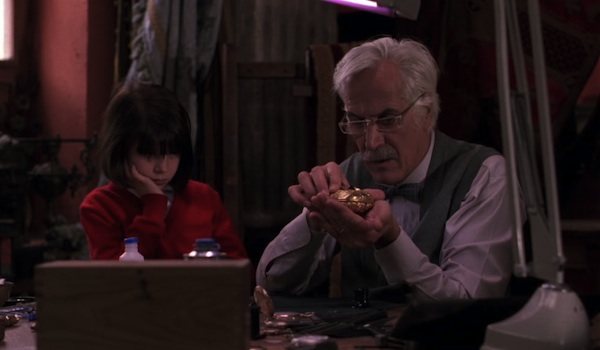Cronos Review
The horror genre is one I don’t get. The mainstream stuff is mind-numbingly stupid and full of pointless gore. The low-budget stuff is typically too low-budget to have any redeeming production values. That being said, it’s an undeniably important genre, more for the influence it’s had on some great directors. One of those directors is Guillermo del Toro, and while I won’t pretend to be all that knowledgable regarding his filmography, I think it’s pretty safe to call him an auteur, and one of his most recognizable characteristics is his unique style of horror. I’d describe it as gothic, very lavish, and more concerned with genuine suspense than surprise. It’s this style of horror that absolutely defines his directorial debut, 1993’s Cronos.
It’s a remarkable film, though one I’m not sure I fell in love with. It’s more a film you admire than become emotionally attached to. It’s impeccably constructed, and del Toro’s direction is shockingly assured, considering this is his first outing behind the camera. He takes themes and conventions that we’ve come to know for years and turns them on their head. You think you know vampire movies? Wait until you see Cronos.
The film follows an elderly antique shop owner named Jesus Gris (Federico Luppi). One day, he comes across a strange golden scarab. He pokes and prods it until it suddenly begins moving and leeches itself onto Jesus. Though it causes him great pain, something extraordinary happens: The scarab seems to have made Jesus younger. He’s got more pep in his step than he’s had in years, and every time he applies the scarab to his body, he feels better. He soon learns, however, that youth is not without its costs. A sickly man, De la Guardia (Claudio Brook), has been searching for the scarab for years, and his twisted nephew (Ron Perlman) isn’t afraid to get his hands dirty to please his uncle. Thus begins a cat and mouse game that will change all three men forever.
Cronos‘ pace is very methodical, but once the credits begin to roll, you’ll realize just how important the pace is. This film isn’t a classic thriller; It’s about exploring and pushing boundaries, and since our protagonist isn’t Superman, this exploration is accompanied by understandable fear. Jesus is never sure what he’s doing is the right thing for him and his family, but after just one spin with the Cronos device, he can’t go back. There are moments in which you can see him at war with himself, and though that might not make for the most expressive performance, nor the loudest, most exciting film, it’s still a brilliant and colossally thrilling watch.
The acting is consistently good, though the performances differ greatly. As I said, Federico Luppi is somewhat reserved as Jesus, though I think he brings just the right amounts of reluctance, daring, and cunning to the role. Ron Perlman and Claudio Brook, meanwhile, chew the scenery in such a delicious way. It’s so much fun to watch them ham it up, and though that might sound bad, it’s really spot on work but both actors. Young Tamara Shanath also does great work as Jesus’ granddaughter. She certainly doesn’t have much to say, but her love for her grandfather brings a much needed dose of emotionality to an otherwise cold and calculating motion picture.
Still, the star is del Toro, who fills every frame of this low-budget ($2 million) film with impressive images and amazing camerawork. Working for the first time with cinematographer Guillermo Navrro, del Toro somehow crafts a film that’s as visually interesting as it is thematically rich. Not an easy task with a plot this deep, complex, and memorable.
As much as I appreciated Cronos, I’m not sure it’s a film that’s for everyone. Some moments are genuinely horrifying, especially in the film’s final third. There are a few scenes you won’t be able to shake from your memory, and they aren’t exactly scenes you want to be ruminating on for a while. Still, it’s an ambitious motion picture that’s well worth your investment, if you know it’s a challenge going in. It’s a tough movie about life and death and the thin line that exists between them, and if that sounds appealing to you, you’ll likely find Cronos as absorbing as I did.
















